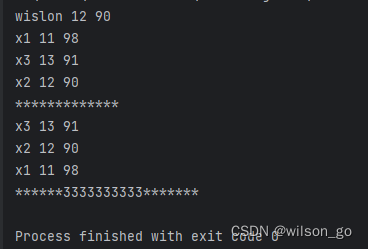C++ 自定义对象 sort 排序
2023-12-13 06:29:42
class Student {
friend bool comp2(Student &i,Student &j);
public:
Student(){
this->Name = "wislon";
this->Age = 12;
this->Scodes = 90;
}
Student(string name ,int age,int scode){
this->Age =age;
this->Name =name;
this->Scodes = scode;
}
void PrintStudent(){
cout<< this->Name <<" "<<this->Age<<" "<<this->Scodes<<endl;
}
private:
int Age ;
string Name ;
public:
int Scodes;
};
bool comp2(Student &i,Student &j){
if (i.Age > j.Age){
return true;
}
return false;
}
int main() {
Student *pStudent = new(Student);
pStudent->PrintStudent();
vector<Student> vs;
vs.push_back(Student("x1",11,98));
vs.push_back(Student("x2",12,90));
vs.push_back(Student("x3",13,91));
sort(vs.begin(),vs.end(), [](Student&a,Student&b)->bool {
if (a.Scodes > b.Scodes){
return true;
}
return false;
});
for (auto v:vs){
v.PrintStudent();
}
cout<<"*************"<<endl;
sort(vs.begin(),vs.end(), comp2);
for (auto v:vs){
v.PrintStudent();
}
cout<<"******3333333333*******"<<endl;
return 0;
}

对私有成员变量排序
使用friend关键字 友元函数 进行 排序
friend bool comp2(Student &i,Student &j);
bool comp2(Student &i,Student &j){
if (i.Age > j.Age){
return true;
}
return false;
}
变量student中写 友元函数comp2 对私有属性Age进行排序
如果是public成员变量排序会非常简单
sort(vs.begin(),vs.end(), [](Student&a,Student&b)->bool {
if (a.Scodes > b.Scodes){
return true;
}
return false;
});
文章来源:https://blog.csdn.net/qq_30505673/article/details/134941419
本文来自互联网用户投稿,该文观点仅代表作者本人,不代表本站立场。本站仅提供信息存储空间服务,不拥有所有权,不承担相关法律责任。 如若内容造成侵权/违法违规/事实不符,请联系我的编程经验分享网邮箱:veading@qq.com进行投诉反馈,一经查实,立即删除!
本文来自互联网用户投稿,该文观点仅代表作者本人,不代表本站立场。本站仅提供信息存储空间服务,不拥有所有权,不承担相关法律责任。 如若内容造成侵权/违法违规/事实不符,请联系我的编程经验分享网邮箱:veading@qq.com进行投诉反馈,一经查实,立即删除!